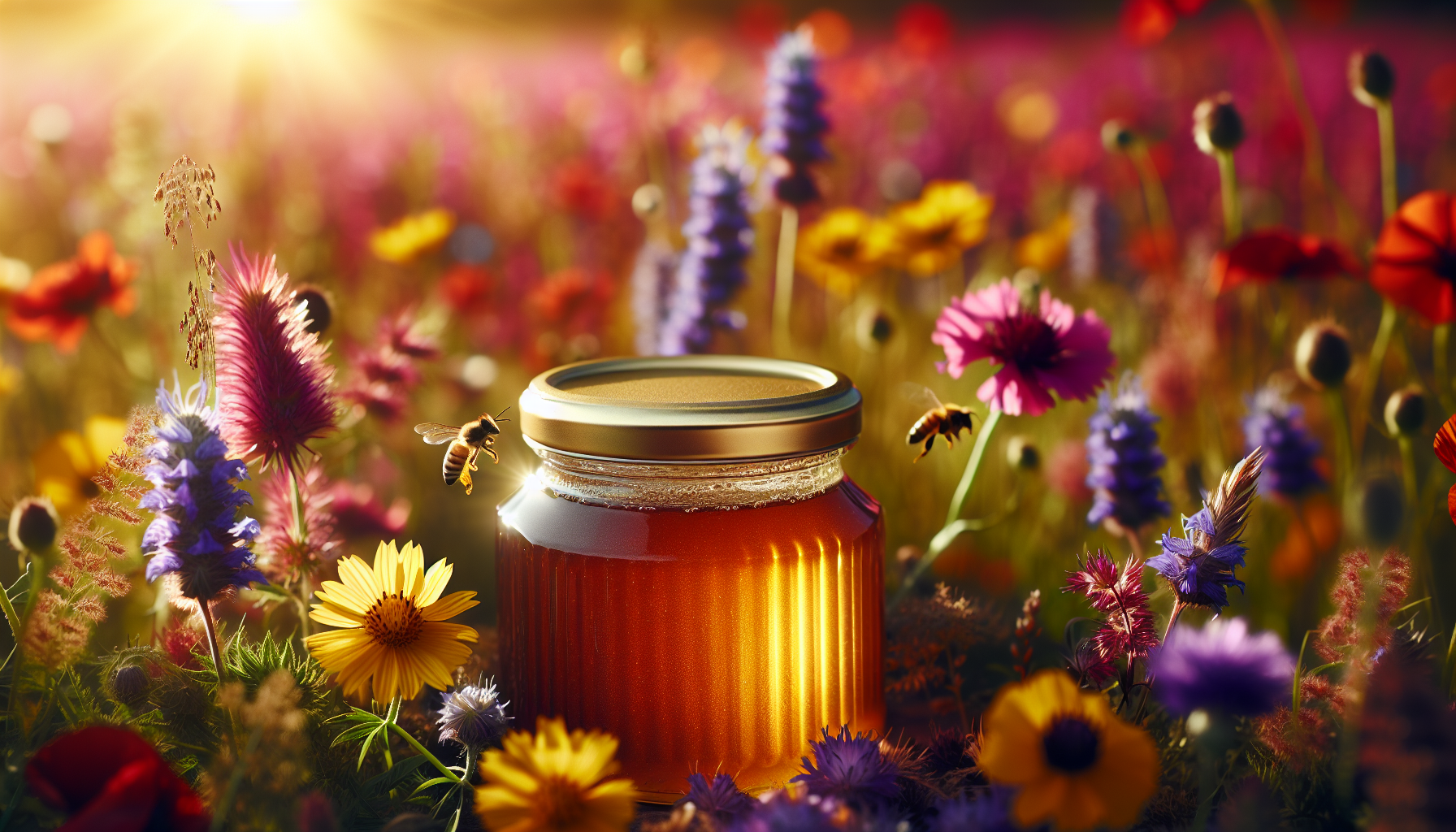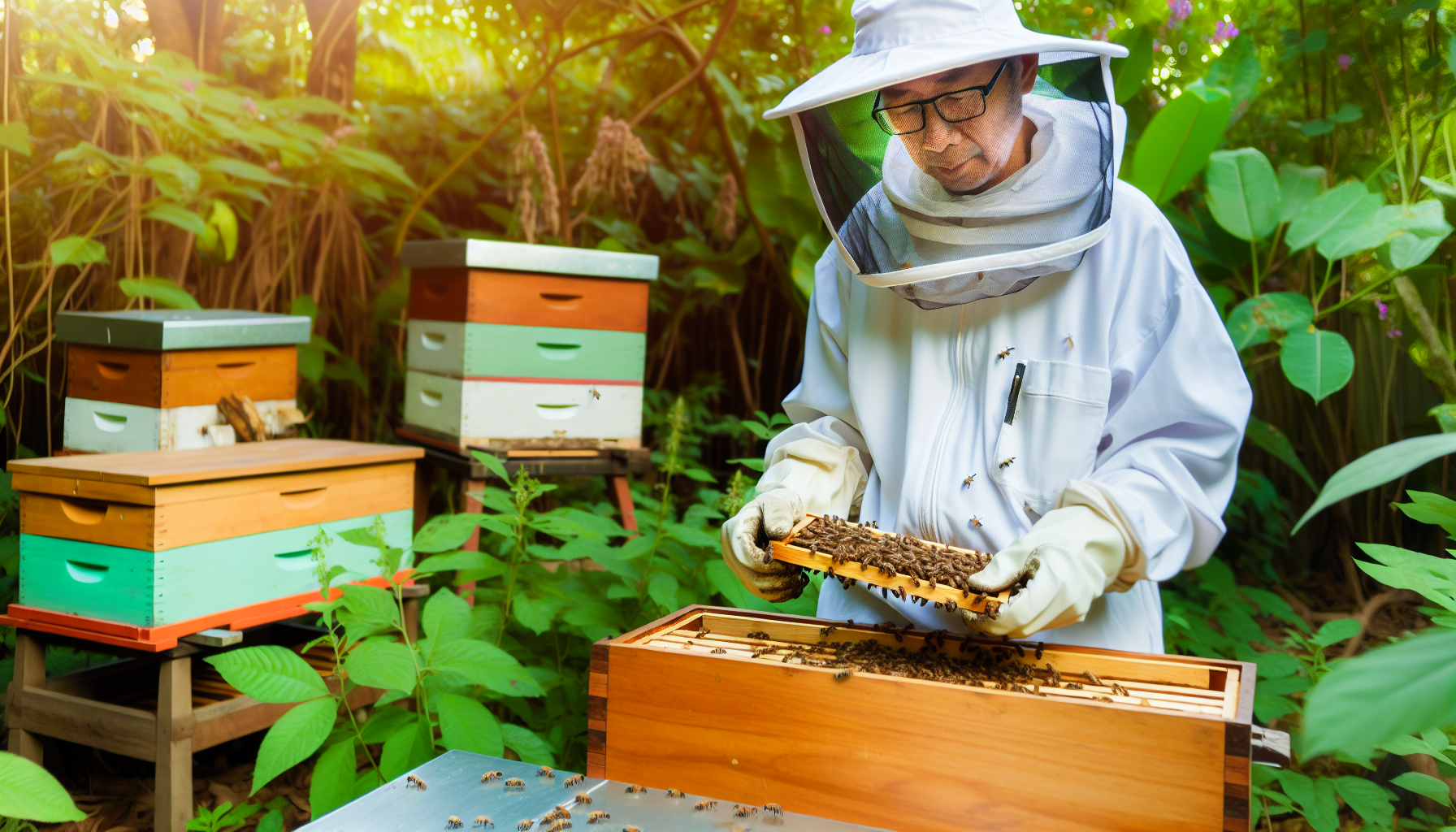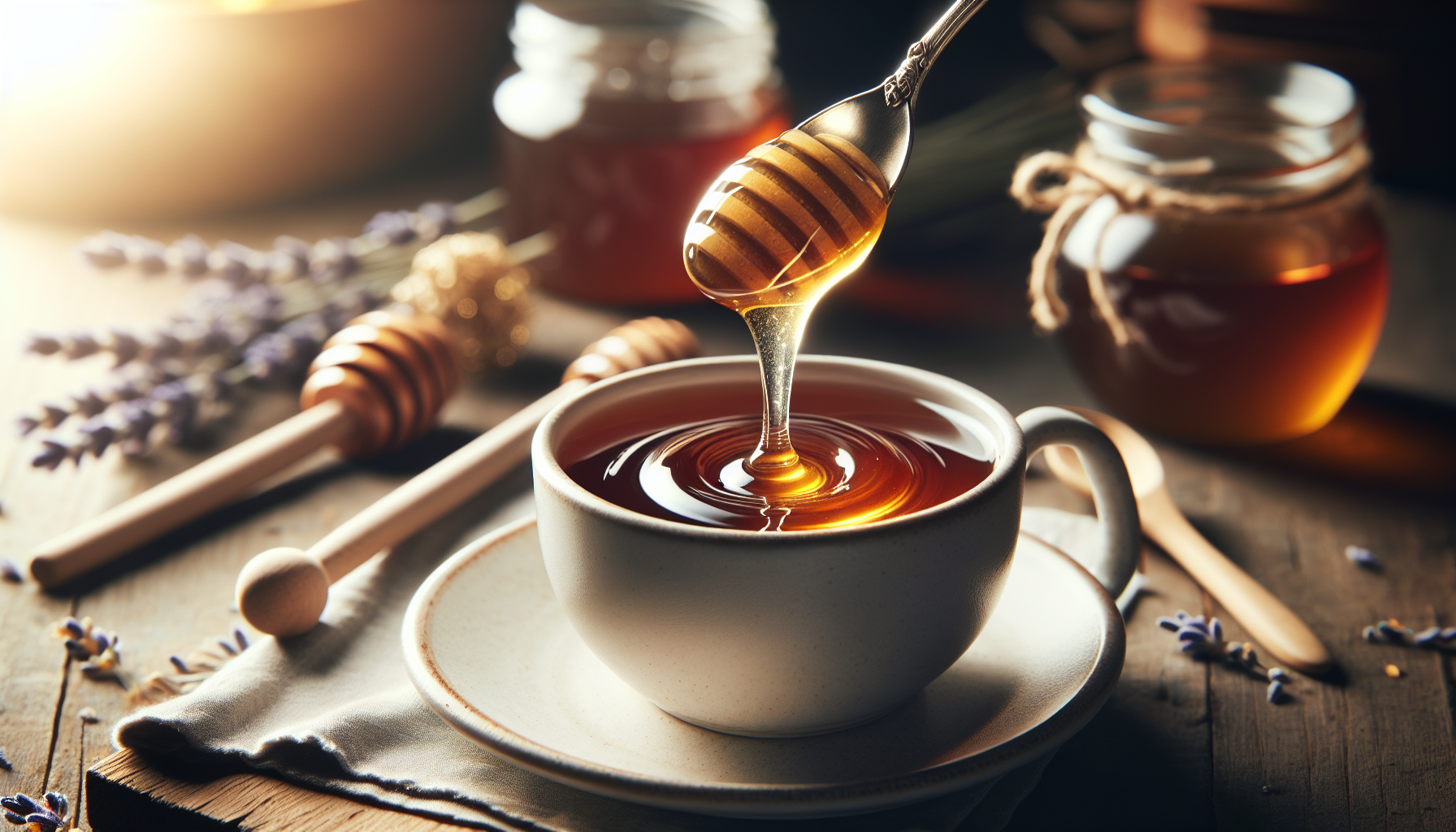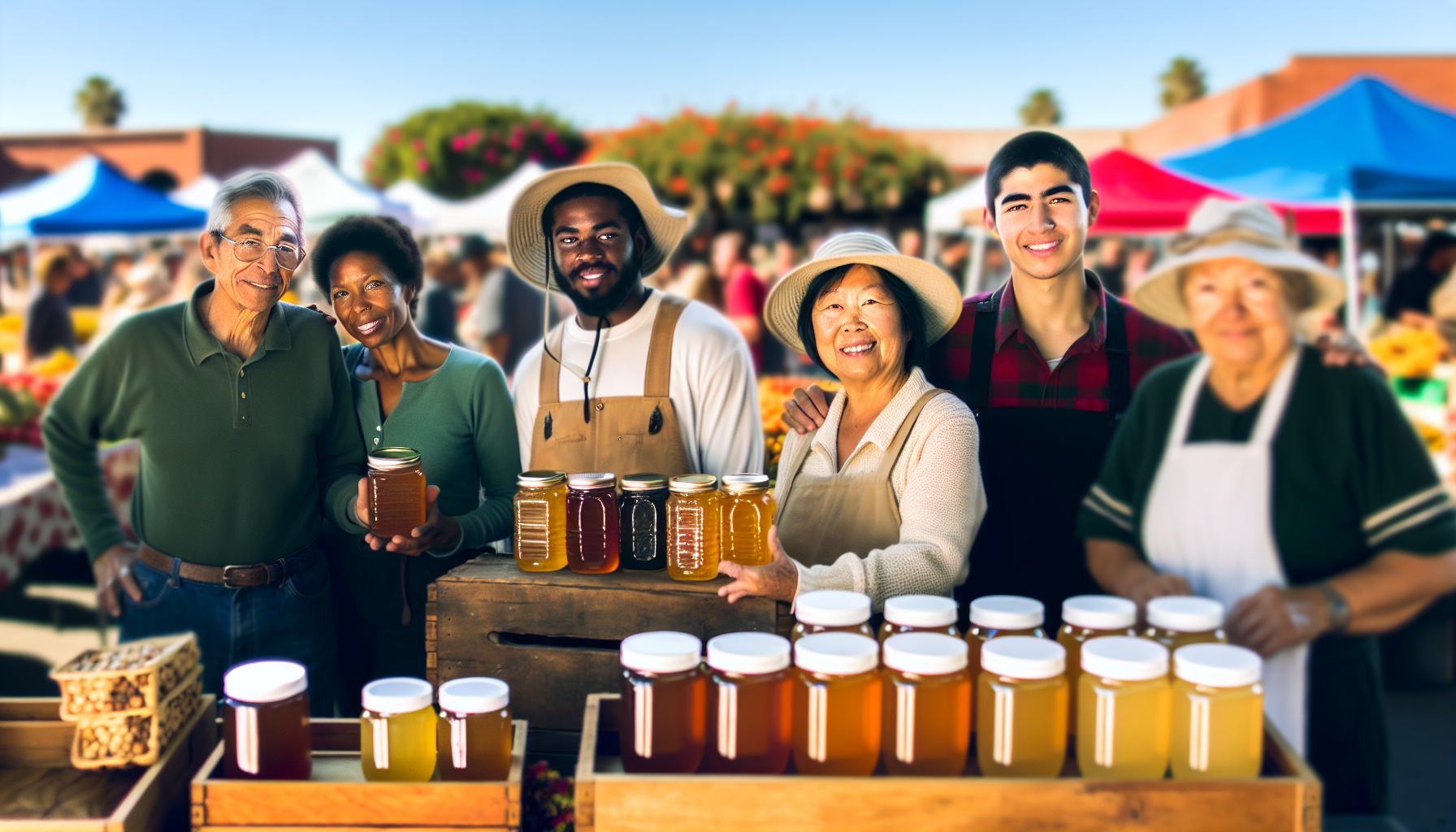Organic honey is more than just a sweet addition to your pantry; it’s a commitment to natural purity and sustainability. This article peels back the layers of what makes honey ‘organic,’ how it nourishes your body, and the sustainable practices that ensure its quality. Learn about the true essence of organic honey without the promotional fluff, and prepare to elevate your knowledge, and perhaps your health, with every spoonful.
- Nature Nate’s 100% Pure Organic, Raw, & Unfiltered Honey is a sweetener as nature intended
- Only ingredient is honey; All we add is the bottle
- We partner closely with beekeepers from around the world to source the highest-quality and best-tasting USDA-certified organic honey
- Nate’s 100% Pure, Raw & Unfiltered Honey is a sweetener as nature intended, with one ingredient: Honey. All we add is the bottle.
- PURITY GUARANTEE: Every bottle of Nate’s most-trusted honey has a purity guarantee to uphold strict testing standards that provide an unmatched level of care and precision that would make any honeybee proud.
- BEST TASTE: Our blend of honey varietals is crafted for exceptional taste, earning us an award-winning flavor through ChefsBestTM.
- Organic light amber wildflower honey
- 12 ounce jar
- Pure raw honey
- DELICIOUSLY SWEET INGREDIENTS: Wholesome Organic Honey is deliciously decadent, with only one simple, pure ingredient – organic honey.
- USAGE: Our organic honey is perfect for sweetening tea and coffee as an everyday treat and adding delicious decadence to baked goods.
- SOURCING: Our organic honey comes from bees foraging in organic zones in Brazil.
- 🌱 Pristine and Pure Goodness: From Nature to You: Sourced from the finest natural reserves, our honey boasts a seamless fusion of taste and wellness, delivering a pure and organic indulgence that nourishes your body and soul.
- 🌏 Conscious Craftsmanship: Supporting Nature, Supporting You: Packaged with eco-conscious devotion, our commitment to sustainability extends beyond the product. Contribute to a greener planet by choosing our honey infused with natural herbs, a choice that’s good for you and the environment.
- 🌿 Sensory Elegance in Every Sachet: Carefully Curated for Your Pleasure: Each pack contains 24 sachets, 10g each, ensuring a convenient and indulgent experience. Take a full or half sachet every 2nd or 3rd day, an hour before breakfast on an empty stomach, to invigorate your senses and feel fresh and energetic.
- 16 ounces of pure organic raw wildflower honey
- Harvested from organic wildflowers for rich, natural flavor
- Perfect for baking, cooking, or drizzling over foods
- 100% pure and natural, US Grade A honey, made in partnership with ethical beekeepers.
- Harvested from nectar of a variety of different organic floral blossoms.
- Natural sweetener perfect for baking, cooking and your favorite warm beverage.
- 24 ounces of organic light amber wildflower honey
- Delicate light amber color with subtle floral notes
- Harvested from organic wildflower meadows
- 24 ounces of organic amber mountain forest honey
- Rich amber color with complex forest notes
- Sourced from pristine mountain forest regions
- 100% All-Natural Raw Organic Honey: Kelley’s raw and unfiltered organic honey is all-natural, unpasteurized, and free of added sugars or flavors. It comes in a squeezable 24-ounce bottle
- All Benefits Preserved: Pure organic honey is not processed, preserving its all-natural vitamins B, C, D, and E, amino acids, antioxidants, essential enzymes, and rich flavor. If crystallization happens, simply give it a warm water bath. Take a large bowl, fill it with warm water, and let your honey sit until the crystals melt away
- USDA Certified Organic Honey: Straight from hives in Brazil, our organic honey is free of pesticides and genetically modified crops (GMOs). In short, the bee colony is kept healthy without any synthetic chemicals
Key Takeaways
- Raw organic honey offers health benefits due to its nutritional profile, including unheated enzymes, vitamins, and antioxidants not found in processed honey. Unfiltered and wildflower varieties provide additional nutrients and distinct flavors from various plants.
- Sustainable beekeeping practices are vital for producing high-quality organic honey. These practices ensure the health of honey bees and the richness of honey’s flavor, which is influenced by the bees’ access to diverse flora within their environment.
- Organic honey, labeled with organic certification, ensures the absence of synthetic chemicals, antibiotics, or GMOs in its production and processing. Eco-friendly and organic standards are critical for maintaining the quality of honey and supporting local and global environmental health.
The Wonders of Raw Organic Honey

Raw organic honey is a natural sweetener that is packed with health benefits, thanks to its rich nutritional profile. It’s unheated, meaning it retains all its natural enzymes, vitamins, and antioxidants, which are often lost in regular honey due to processing. The result is a product that is not just sweet, but also beneficial to our health and well-being.
Unfiltered and wildflower honey varieties have their unique charm. These types of honey are less processed and contain more pollen, making them even more nutrient-dense. They also offer a more diverse range of flavors, thanks to the variety of flowers from which the bees collect nectar. Now, we will explore these two distinctive varieties of raw organic honey in detail.
Unfiltered Honey
Unfiltered honey is raw honey in its purest form. Unlike regular honey, it does not undergo intense processing, which often eliminates beneficial nutrients like pollen. This results in a more cloudy appearance, but it’s a small price to pay for the extra health benefits it offers.
The unfiltered variety of honey:
- Contains more pollen and wax particles, which enhance its nutritional value and add to its unique taste
- Offers a diverse range of flavors due to the different plants from which bees collect nectar
- Is often favored for enhancing the natural sweetness of foods, such as yogurt.
Wildflower Honey
Wildflower honey, also known as polyfloral honey, is another variety of honey that stands out for its unique flavor profile. It’s made by bees that have collected nectar from a variety of wildflowers and plants. This leads to a more potent and complex flavor compared to other honey types.
The flavor of wildflower honey can be described as:
- Sweet
- Fruity
- Deeply flavored
- Noticeable floral and earthy undertones
The assortment of wildflowers surrounding the beehive significantly influences its flavor profile. Each flower provides distinct nectar flavors, contributing to a nuanced taste that mirrors the diversity of the flowers visited by bees.
The Journey of Honey: From Hive to Jar

Appreciating this natural sweetener requires an understanding of its journey from the hive to the jar or bottle. It’s a complex process that relies heavily on the industrious honey bees and sustainable beekeeping practices. Honey bees gather nectar from flowers, which is transformed into honey through a process that involves evaporation and enzymatic activity within the hive.
When it comes to sustainable practices, beekeepers have a significant role to play. They facilitate access to a variety of flowers for their bees, benefitting not just the bees, but also enriching the unique flavor profile of the honey they produce. The location of a hive, for instance, impacts the flavor and properties of honey, as the honey reflects the local flora within a 2-mile radius of the hive.
The Role of Honey Bees
Honey bees, the key contributors to honey production, serve a dual role in not only producing honey but also facilitating pollination. Bees collect nectar from flowers using their extended tongue and store it in their honey stomach. Once back at the hive, they transfer the nectar to other bees, which process the nectar by decreasing its water content and incorporating enzymes to create honey.
The type of bee also influences the quality of honey. Different bee species and the surrounding vegetation impact the composition, color, sensory characteristics, and antioxidant properties of honey. This is why honey from different regions or produced by different species of bees can taste remarkably different.
Sustainable Beekeeping Practices
The principal focus of sustainable beekeeping lies in ensuring the wellbeing and lifespan of honey bees. Beekeepers who practice sustainable methods:
- Treat the colony as a complete organism
- Strive to respect natural processes and minimize intrusion
- Create replacement colonies from within the apiary
- Prioritize airflow through the hives to prevent obstructions
These measures help to ensure the well-being of the bees and promote sustainable beekeeping practices.
Sustainable beekeeping not only benefits honey bees but also the environment. Beekeepers who opt for organic methods maintain their hives without the use of synthetic chemicals, antibiotics, or genetically modified organisms (GMOs). This results in honey that is as pure and natural as possible, offering maximum health benefits for consumers.
How to Use Organic Honey in Your Everyday Life

Organic honey, far from being just a sweetener for tea or a spread for toast, finds myriad uses in our daily lives. Here are some of its versatile uses:
- Replacing refined sugar in our diet
- Using as a natural remedy for various ailments
- Adding to homemade face masks for glowing skin
- Mixing with lemon and warm water for a soothing drink
- Using as a natural cough suppressant
- Applying to minor cuts and burns for healing properties
You can incorporate organic honey into your cooking to enrich the flavors in your dishes. Its inherent sweetness can add complexity and harmony to your culinary endeavors, providing an elevated gustatory sensation. It also serves as an exceptional natural sweetener for beverages, whether it’s your morning coffee or a refreshing iced tea in the afternoon.
Replacing Refined Sugar
Replacing refined sugar with organic honey in your diet can provide a multitude of health benefits. Here are some reasons why:
- Organic honey is richer in nutrients
- It is more digestible
- It has a lower glycemic index, resulting in a less abrupt increase in blood sugar levels
- Its heightened sweetness allows you to use less honey to achieve the same level of sweetness as sugar.
When substituting sugar with organic honey in baking, it’s recommended to use less honey because of its higher sweetness level. This can result in a slight modification in the texture and taste of your baked goods, but the health benefits it offers are well worth it.
Natural Remedies
The health benefits of organic honey extend beyond its nutritional value. It has been used as a natural remedy for centuries due to its therapeutic potential. Some of the medicinal uses of organic honey include:
- Treating diseases
- Healing wounds
- Fighting off infections
- Alleviating cold and flu symptoms
Organic honey has a wide range of health benefits and can be a valuable addition to your natural medicine cabinet.
One of the most common uses of honey as a home remedy is for cough and cold, as well as for a sore throat. It can reduce the frequency and severity of cough and provide relief to the throat. Simply mix a spoonful of honey with warm water or herbal tea, and you have a natural, effective cough remedy.
Ensuring Purity and Quality: Organic Certification and Testing

In the process of purchasing organic honey, one should ensure to check for organic certification. This ensures that the honey has been produced and processed without the use of synthetic chemicals, antibiotics, or genetically modified organisms (GMOs). It’s also a guarantee that the honey meets the requirements of USDA organic regulations.
Organic certification also ensures that honey is harvested and processed in a way that preserves its natural qualities. Companies such as Nature Nate’s guarantee that every batch they produce is 100% pure, providing consumers with assurance of the quality of their honey.
Organic Standards
To be certified as organic, honey must meet strict standards set by the USDA. These standards require that the honey be:
- produced and processed without the use of synthetic chemicals
- produced and processed without the use of antibiotics
- produced and processed without the use of genetically modified organisms (GMOs)
The organic certification process involves on-site inspections to ensure that apiaries and harvesting methods meet organic standards. The process also requires that at least 5% of certified operations undergo unannounced inspections annually.
Pesticide-Free
Pesticide-free honey ensures a pure and natural product, providing you with only honey that is free from harmful chemicals. The use of pesticides can have harmful effects on honey bees, reducing the availability of diverse floral sources and impacting the quality of the honey.
Producing honey without pesticides requires placing the hives near clean water and organic crops, and ensuring they are away from non-organic plants and polluted areas. The Environmental Protection Agency (EPA) has established policies aimed at safeguarding bees from pesticide exposure during honey production.
Supporting Local Beekeepers and Eco-Friendly Production

Purchasing organic honey not only provides you with a superior product but also aids local beekeeping communities. Purchasing Organic Fair Trade Raw Unfiltered Honey contributes to the support of local beekeeping communities through the provision of Fair Trade premiums, which in turn aid in funding education, healthcare, and community infrastructure.
Beyond bolstering local beekeepers, eco-friendly production methods contribute significantly to the sustainability of the honey industry. We’ll explore two such methods: utilizing solar power for honey production and employing grass-fed cows in the production of organic ghee.
Solar-Powered Production
Solar power is a renewable energy source that can be harnessed to reduce the environmental impact of honey production. It facilitates the implementation of pollinator-friendly solar installations, which enhance crop yield, promote groundwater recharge, and mitigate soil erosion.
To set up a solar-powered honey production system, essential equipment includes:
- Solar panels to generate electricity
- Honey extractors to extract honey from the combs
- Wax processing units to process beeswax
- Electric fences for the apiaries
These equipment are necessary to operate key machinery and ensure the smooth functioning of the honey production system.
Grass-Fed Cows and Organic Ghee
The quality of organic ghee, a byproduct of honey production, also plays a role in the honey industry. Ghee is made from butter that is produced by grass-fed cows. This results in milk with elevated levels of essential dietary fats, including CLA, omega-3, and omega-6 fatty acids.
Grass-fed cows’ diet has a significant impact on the quality of the butter used for ghee production. A grass-fed diet abundant in plants and greens from the pasture can lead to butter with a more pronounced yellow hue, indicative of its high nutrient content.
Debunking Myths: Raw vs. Heated Honey
There exist numerous misconceptions surrounding raw and heated honey. Some believe that raw honey is superior in every way, while others prefer the smoother texture and uniform taste of heated honey. Both varieties have their unique qualities and benefits.
While the process of pasteurization, which involves heating honey, can modify its nutritional characteristics, it does not completely diminish its health benefits. When honey is unpasteurized, it undergoes minimal heating during processing, thus preserving a significant portion of its nutritional attributes, such as enzymes, vitamins, and minerals.
Pasteurization and Filtering
Pasteurization is the process of heating honey to a specific temperature to kill any yeast cells and prevent fermentation. While this process can lead to a reduction in:
- antioxidants
- amino acids
- vitamins
- minerals
- beneficial enzymes
it does not completely eliminate these nutrients.
On the other hand, filtering is a process that removes tiny particles from honey, like pollen, dirt, bee parts, and wax, resulting in clear honey free from impurities. However, this process can also remove beneficial nutrients and enzymes, thus reducing the nutritional value of the honey.
Crystallization
Honey crystallization is a natural process that occurs when glucose in honey separates from water and forms crystals. Despite the common misconception, it is not a sign of impurity or low quality. In fact, raw honey is more likely to crystallize due to its high glucose content and the presence of natural substances.
Temperature plays a significant role in honey crystallization. The fastest crystallization occurs between 13 and 15.5 °C. If your honey crystallizes, you can easily return it to a liquid state by placing the jar in a warm water bath.
Summary
In this exploration of the world of organic honey, we’ve discovered the intricate journey from hive to jar and the vital role of honey bees and sustainable practices in honey production. We’ve also learned about the rich, complex tastes of unfiltered and wildflower honey varieties, how to use honey in our daily lives, and the importance of organic certification and testing. Furthermore, we’ve debunked common myths about raw and heated honey. Remember, when you enjoy a spoonful of raw organic honey, you’re not just savoring its natural sweetness, but you’re also supporting local beekeepers and eco-friendly production methods.
Frequently Asked Questions
What is the difference between honey and organic honey?
The main difference between honey and organic honey lies in the production process. Organic honey comes from bees that are kept in organic conditions, avoiding synthetic pesticides and antibiotics.
Does honey have to be organic?
Yes, honey can be raw but not necessarily organic, although pure honey can be organic if it comes from flowers that haven’t been exposed to synthetic pesticides or herbicides. Therefore, organic honey is not a requirement.
What is raw honey?
Raw honey is honey that comes straight from the honeycomb without pasteurization, and it may contain pollen, beeswax, and bits of dead bees, giving it a cloudy appearance.
What are the benefits of raw organic honey?
The benefits of raw organic honey include acting as a natural cough suppressant, offering relief from allergies, and being more easily digestible compared to sugar. Choose raw organic honey for its nutrient-rich and minimally processed properties.
What is the difference between unfiltered and regular honey?
Unfiltered honey is less processed and contains more pollen, resulting in a cloudy appearance and a more diverse range of flavors, while regular honey undergoes more processing, which can remove beneficial nutrients. Therefore, unfiltered honey is more nutritious.









